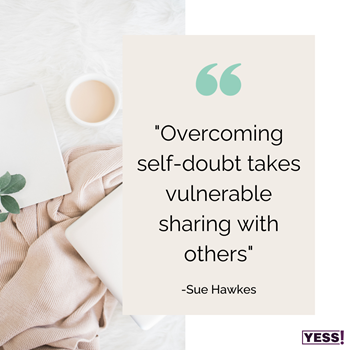In yesterday’s blog I shared how I manage self-doubt when my Imposter Syndrome creeps up. Find more practices below!
Be Vulnerable with Others
Being vulnerable is crucial when overcoming self-doubt, and that can be difficult at first! The times we are feeling less than our best are usually when we would rather “fake it till you make it,” and pretend like everything is fine. This might work on the surface-level, but truly overcoming the self-doubt takes vulnerable sharing with others. Talking about your feelings with other leaders is the best option; find a peer group of other business owners or executives who understand where you are coming from. It often feels as if there is no one who can possibly relate to all we are challenged with, but finding other leaders who can speak to similar situations will help you feel comfortable opening up. The more successful we become, the less we allow ourselves to talk about the challenges we face because we believe that would crack the façade of how we appear to the world. This is a very lonely way to live. Pride limits us when it stops us from connecting with others in this way.
It can also be difficult to open up because we don’t want to burden others with our problems. Often, however, this self-disclosure can be the doorway to intimacy and depth in relationships. Once you admit you are overwhelmed, it opens the door for everyone else to be vulnerable as well.
Ask for Help
Many leaders refrain from asking for help because they worry it will pop their perceived bubble of perfection. When they can do so with trusted peers, it’s a relief to hear the other person say, “I’ve been there too.” Remember, even the best leaders need help and, in fact, knowing when they need help is part of what makes them so effective. You can accomplish more as a company when you ask employees for help and make them part of the solution. When you don’t accept help, you’re denying others the good feelings they would otherwise enjoy, and giving makes us all feel good. By declining to receive, we’re taking from others. Accepting help creates permission for everyone else to be vulnerable and tell the truth about their self-doubt as well.
You’ll never know how much others care about you until you take off your mask and let yourself be seen as you are, vulnerabilities, failings, and all. Leaders become more effective by admitting our limitations and sharing our insecurities.
